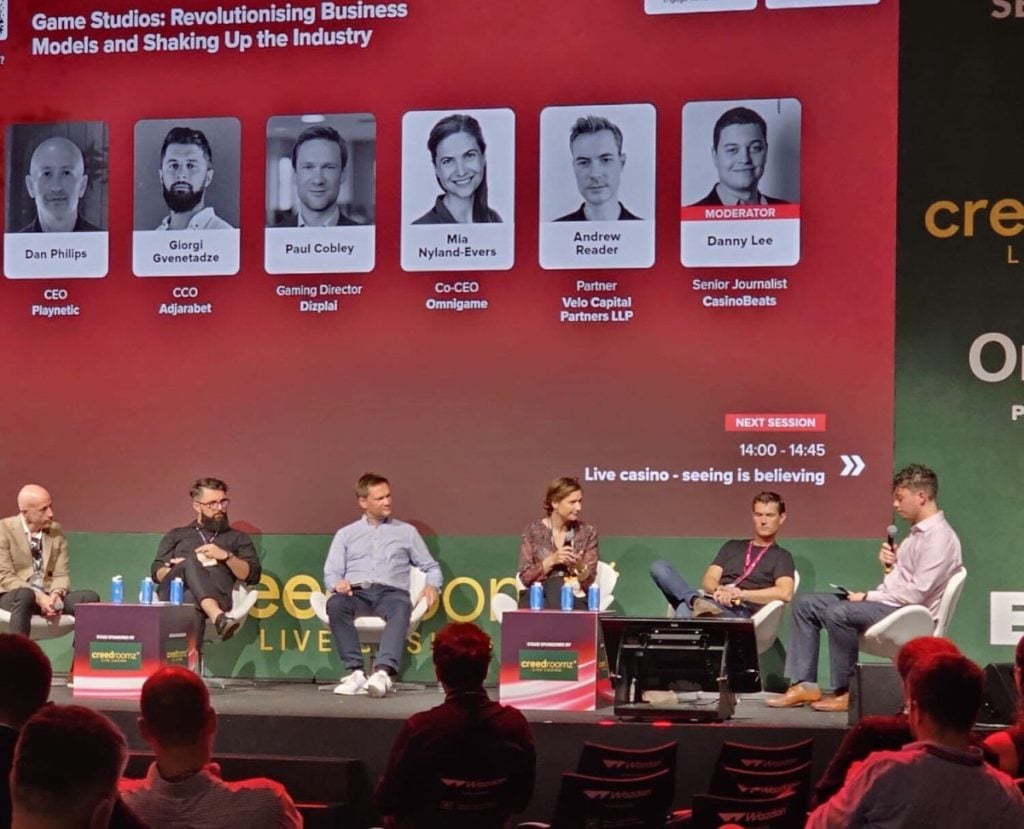The online casino industry has been overloaded with content in recent years, and the saturation of the slots market continues to create cause for concern with emerging studios.
With operators required to sift thousands of games to find what their players desire, game developers are tasked with creating unique ways to push their content to the top of the pile and cement themselves as key figures in the industry.
This challenge was put under the spotlight at SBC Summit as a panel addressed the current state of the online casino market to analyse the ways that studios are taking revolutionary business approaches to achieve long-term success.

Moderated by CasinoBeats’ Danny Lee, the panel first questioned why developers are tasked with taking alternative and often challenging business strategies to gain prominence in the industry – as even the audience agreed by show of hands that it’s no mean feat.
Dan Phillips, CEO at Playnetic, began by talking through the challenges facing new and emerging studios, pointing out that operators themselves are also turning to different strategies for uploading content, such as forming in-house studios.
“I’m old enough to have seen the cycle of this industry,” he said. “Going from operators that understood their betting business, to using technology companies who could deliver everything else.
“We’ve been through this cycle where it comes in-house, with operators deciding that they want to build their own games, before turning to out-sourcing again.
“We have a lot of content suppliers out there, we have a hell of a lot of content out there. It’s about how you differentiate yourself, and how you keep yourself relevant.”
Phillips then referred to the strategies taken by Playnetic, an igaming supplier that burst onto the scene within the last year, to make a name for itself in an overcrowded industry.
“What we’re trying to do is service operators at different levels, at the same rates, at the same time,” he continued. “We built three game studios to be able to do that, but that’s not necessarily easy for others to do so from the start.
“To keep yourself relevant, frictionless, to be credible and to listen – there are some really fundamental things that studios need to do, and then you will get through to the operators. If you can show that you are delivering when you say you’re going to deliver, and it’s relevant to the market you want to work in, then I think you can make headway.”
Mia Nyland-Evers, Co-CEO at Omnigame, then jumped into the conversation. Faced with a question on the difficulties being faced by new studios, she emphasised that companies need to place players at the forefront of their practices.
She commented: “In the end, something is happening now where everyone is forgetting the player. What does the player actually want? There are so many different things [for studios to consider], from aggregators to operators, people to help with marketing, they’re forgetting to actually ask what the player wants.
“There are more and more game studios, and they come because – like also with our game studio – they come from a passion of wanting to make great games. But when the revenue share that you get from each deal you make is shared out to so many different ends of the rope, it’s so hard to make a business. It’s so hard.
“When there are so many middle men that need to have something, then it’s a real struggle. What game studios then have to do is make games that are more cheap, and the quality isn’t there.
“The player doesn’t want that, they want good quality games. Game studios need to be acknowledged more for the hard work they put in so they can make greater games.”
“Show me something innovative, something that is going to revolutionise customer behaviour”
Giorgi Gvenetadze, CCO at Adjarabet
The panel then moved onto analysing the different strategies and techniques that studios are using to push their games to the forefront of the industry, with Giorgi Gvenetadze, CCO at Adjarabet, explaining the approaches that his company appreciates as an operator.
“We’re approached dozens of times each week, some of them my gaming team will meet and others we have to turn away. How do we filter them? The priorities for us, and I’m sure for the majority of other operators, is innovation within the games and mechanics, as well as the stability in the tech that the product is built on.
“There are plenty of other fish in the sea but not all the fish must look like the best ‘Big Bass Bonanza’ fish. We are receiving offers that say ‘oh my god we are creating a game that looks like your most popular game, but we will give you a better price’, for example.
“I don’t care about the better price, because my users already play their favourite slot. Show me something new, show me something innovative, something that is going to revolutionise customer behaviour.
“This is something that we have seen in the industry for the past couple of years. The innovation finally pays off. We see the boom of crash games – that was innovation. We saw the boom of bonus buys – that was innovation.”
Recalling that he himself has been in the seat of an operator before, Phillips was brought back into the conversation to provide a rebuttal for Gvenetadze’s desire for innovation, suggesting that it can be “a big challenge”.
“I don’t disagree, but to say ‘show me the innovation’ can be a big challenge. It’s a process, because what might be innovation to me in one market may not be [innovation] for your markets.
“I want to produce five or six good games every month. So you [operators] will know that you’ll get them from me every single month. And then, hopefully, one of those will become a hit. That’s how we’re approaching it, rather than trying to force innovation.”
The next panellist to question whether studios should approach operators with “the next best thing” was Andrew Reader, Partner at Venture Capital Partners LLP, a firm with a wealth of experience in investing in game studios.
“I think a start-up studio, if they’re trying to differentiate themselves, shouldn’t necessarily come with ‘I’ve got the next best thing that hasn’t been seen’, because that’s very risky.
“I’ve seen many graveyards of unfortunate studios that have tried that approach straight off-the-bat without the reputation, coming with something that hasn’t been seen before. It’s not impossible, but I wouldn’t be betting on it, or investing in it.”
To provide an alternative approach through experience with new studios gaining success in the oversaturated online casino industry, Reader suggested that unique insights, research and knowledge of narratives and trends can provide great selling points.
“I think what they need to be doing is coming up with some unique insight into why they think a certain game has been successful. Not the ‘I’ve copied Big Bass Bonanza’ story, but ‘I’ve looked at that game and played it a lot and it’s a narrative that resonates with me and operators’.”
Reader continued: “Say ‘these are the four or five mechanics or things that I think have done really well with that game, I understand that and I’ve actually incorporated that into this game. It looks and feels completely different, but I think it has all the same ingredients’, I think that’s a much more compelling narrative.”
Although operators are usually looking for new games to add to their platforms to encourage player acquisition and retention, many tier-one brands continue to look for gamification features that can support these metrics, often turning to free-to-play games.
As these titles also require developers, the panel featured Paul Cobley, Gaming Director at Dizplai, who outlined the difficulties being faced by studios creating such products.
“It’s the same thing as the innovation with the games, it’s really important, ” he said. “We aim to enhance the entire customer lifecycle. Acquisition, engagement, retention, referrals and revenue.
“you need to make sure you stand out and make your passion pay out”
Mia Nyland-Evers, Co-CEO at Omnigame
“Not everyone wants all of those things, especially not out of the gate, and even with a client you have different stakeholders that want different objectives. So we need to make sure that you have a product suite that targets those objectives.
“A second thing is ease of integration. No one has bandwidth anymore, everyone has got a full roadmap. With a free-to-play product that isn’t focused on immediate revenues, we just have to appreciate that we’re not going to be a priority. So we have to be easy to integrate and easy to work with.”
Before the clock ran down and the panel drew to a close, Lee asked the panel what they believe are the most important things to consider when entering the online casino industry and striving for long-term growth and success.
This led Phillips to encourage “transparency and honesty”, suggesting that studios should “say no and say yes, but make sure that you’re doing everything for the right reasons and for what you got into the industry for”.
The CEO continued: “You can compromise, but not to the point where you stop being what you are. I do think it’s important to retain that. After that, those deals will come.”
Gvenetadze then echoed Phillips’ sentiment, stating that “transparency is number one”. He then explained that finding the “right balance between innovation and key revenue drivers” is equally important, as well as striving to have “the best management team” to take care of partner relations.
“The relationship with the client is probably the most important thing for us,” agreed Cobley. “If you haven’t got someone championing your whole concept, then you’re in a lot of trouble.
“There are a lot of Jerry Maguires wanting you to ‘show me the money’ in gambling so you really need someone on board that is actually thinking about the long-term strategies.”
Nyland-Evers also reiterated Phillips’ point on doing everything for the right reasons, explaining that “really making sure why you’re doing it needs to come through, you need to make sure you stand out and make your passion pay out”.

















